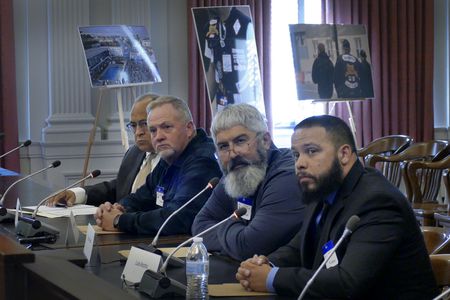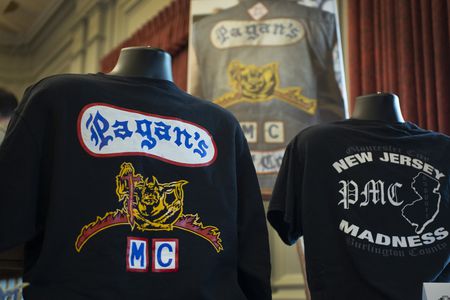The man’s mistake was passing a Pagan.
He was cruising on his motorcycle on Route 1 in Elizabeth when he passed two other drivers on the right of the multi-lane roadway in June 2019.
He didn’t think anything of it when he exited the highway, but soon realized he was being tailed by a motorcycle and a car. He made a series of turns, but couldn’t shake them.
Then they cut him off, blocking his escape. It was at that moment it became clear who the man was dealing with: two members of the Pagan’s Motorcycle Club.
“Do you know who we are?” the Pagans yelled at the man, according to a police report.
The Pagans beat him with a small bat and a wrench, officials said. The victim would file a police report, but quickly rescinded it, fearful of retaliation at the hands of one of the most dangerous outlaw motorcycle clubs in the country.
Seemingly random assaults like these on the citizens of the Garden State have officials at the New Jersey State Commission of Investigation urging law enforcement to take action. A report released Wednesday by the group, an independent state watchdog formed in the late 1960s to investigate public corruption and organized crime, says the Pagans have increased their membership ranks in the past three years and pose a growing threat to the public.
Not only are there violent attacks on rival biker clubs like the Hells Angels and the Warlocks, the report states, but a “newfound level of aggression has led to drive-by shootings, savage beat downs of adversaries and unprovoked physical assaults on members of the public across New Jersey.”
In another incident, a man was in a bar in Elizabeth — a city dominated by the Pagans — when he started talking to a female bartender. A Pagan approached him and threatened him, a police report said. Later, the same Pagan and two of his companions “ambushed” the patron, hitting him twice in the head with an axe handle — a weapon of choice for the Pagans.
The man told police he had never seen his attacker prior to that evening in January 2019.
The 20-page SCI report was issued following a lengthy investigation of the Pagans, identified by the F.B.I. as one of the four major outlaw motorcycle clubs operating in the U.S. That group includes the Hells Angels, the Outlaws and the Bandidos.
In October 2019, the commission held an exhaustive hearing in Trenton detailing how the Pagans are increasing membership in all corners of the state.
The hearing featured testimony from SCI investigators, New Jersey State Police officers and county prosecutors. It included interviews with Pagan members — their voices altered to protect their identities — and video of a brutal attack in 2018 near a Hells Angels clubhouse in Newark.
The most climactic moment came at the hearing’s end when three reputed leaders of the motorcycle club were called to testify. Citing their Fifth Amendment right to remain silent, the alleged leaders declined to answer any of the council’s questions.

Hugo “Zorro” Nieves, the alleged vice president of the Pagans, broke his silence to say, “It is not the policy of this club to engage in any criminal activity, and that’s all I will say about that.”
The “Pagan’s Motorcycle Club,” as it’s officially called, formed in Prince George’s County, Maryland, in 1959. The group, which started with just 13 members, evolved into a formal club in the 1960s, spreading to neighboring states. It was around this time it adopted the outlaw motorcycle mentality, collectively known as the “one-percenters.” The theory is most motorcycle riders are law-abiding citizens, except for the 1% who aren’t. Those self-proclaimed members proudly display a “1%” patch on their jackets.
Now there are 900 Pagans spread across 12 states and in Puerto Rico, officials said. In New Jersey, Pagans membership — which has always been strong in South Jersey — has grown at an alarming rate in recent years, with approximately 200 members in 17 chapters. There has been an almost 50% increase in chapters in New Jersey over the past three years, officials said.
“It’s expanding at a rate we’ve never seen before,” Edwin Torres, an SCI investigative agent, said in reference to Pagan membership in New Jersey. “In New Jersey, it’s going to be hard to find a county where there isn’t a Pagan presence.”
The rise in Pagan membership in New Jersey, first reported by NJ Advance Media in May 2018, is indicative of a broader national effort by reputed Pagan President Keith “Conan” Richter to beef up numbers along the East Coast, officials said. Richter, who was sentenced to 16 years in prison in 1998 for attempted murder and racketeering and released in 2012, took control of the Pagans in 2018, according to officials.
Under the control of Richter, the Pagans have been absorbing smaller, local motorcycle groups to increase membership, officials said. The Pagans have also started recruiting light-skinned Latino members from traditional street gangs, like the Latin Kings, though they still prohibit Black people from joining their ranks.
More violent incidents have been committed by the Pagans in a recent 18-month period than in the prior 10 years, according to the SCI report.
“The actual tally was likely higher because many incidents go unreported,” the report said.

The Pagans are run like a business and are organized as such.
The club earns its proceeds from drug trafficking, the commission said. It sells marijuana and cocaine, but a bulk of its business is from methamphetamine, acquired from a Mexican drug cartel. The club also extorts business owners and relies on members to pay monthly dues of $100.
The club is structured with a president, vice president, sergeant at arms, secretary and treasurer. There are also individual chapter presidents, and those members are referred to as the “Mother Club,” responsible for managing Pagans’ business and recruitment efforts on a local level. Unlike other motorcycle clubs, the Pagans don’t have a clubhouse, but hold weekly meetings called “church.”
One of the more disturbing elements of the investigation, the commission said, is that sensitive law enforcement information regarding the Pagans has been leaked to members of the club.
“This is a serious matter that requires immediate attention from the larger policing community,” the report said.
The group is also able to thwart law enforcement by utilizing encrypted cellphone apps and counter-surveillance efforts, including flying a drone at a large gathering of Pagans at Wildwood’s “Roar to the Shore” event.
The commission recommended the state Attorney General’s Office create a working group comprised of law enforcement officials at every level devoted to identifying and prosecuting criminal activity conducted by outlaw motorcycle clubs. It should also share information among agencies to identify larger trends, the report said.
The SCI also said every officer in New Jersey should undergo training in case they encounter these clubs in routine crime investigations.
Make sure you have subscribed to our Facebook page or Twitter to stay tuned!
Source: NJ.com
